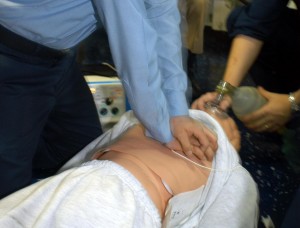Lit of the Week – 4/12/16
Kudenchuk PJ, Brown SP, Daya M, Rea T, Nichol G, Morrison LJ, Leroux B,
Vaillancourt C, Wittwer L, Callaway CW, Christenson J, Egan D, Ornato JP,
Weisfeldt ML, Stiell IG, Idris AH, Aufderheide TP, Dunford JV, Colella MR, Vilke
GM, Brienza AM, Desvigne-Nickens P, Gray PC, Gray R, Seals N, Straight R, Dorian
P; Resuscitation Outcomes Consortium Investigators. Amiodarone, Lidocaine, or
Placebo in Out-of-Hospital Cardiac Arrest. N Engl J Med. 2016 Apr 4. [Epub ahead
of print] PubMed PMID: 27043165.
Clinical question / background:
- Compared to placebo, does administration of amiodarone or lidocaine improve mortality or neurologic outcome in patient’s with out-of-hospital cardiac arrest due to ventricular fibrillation or pulseless ventricular tachycardia?
Design:
- Randomized, double-blind, placebo-controlled trial at 10 North American centers
- 3026 patients with out-of-hospital cardiac arrest
- 974 amiodarone group
- 993 lidocaine group
- 1059 placebo group
- Inclusion: Adults (> 18 y/o) with non-traumatic, shock-refractory VFib or pulseless VTach + IV or IO access
- Shock refractory = delivered 1 or more shock during resuscitation
- Exclusion: already received Amiodarone or Lidocaine OR known hypersensitivity to these drugs
- Normal pre-hospital cardiac arrest care + administration of study drugs or placebo
- Primary outcome: survival to hospital discharge
- Secondary outcomes: survival with favorable neurologic status at discharge defined as MRS < 3 (conduct ADLS independently or with minimal assistance)
Intervention:
- Lidocaine IV
- Initial dose of 120 mg IV (60 mg if patient less than 100 lb)
- Second dose of 60 mg IV if first dose unsuccessful
- Amiodarone IV
- Initial dose 300 mg IV (150 mg if patient < 100 lb)
- Second dose of 150 mg IV if first dose unsuccessful
Control:
- Normal saline administration
Results:
- No significant demographic differences between three groups
- No significant difference in survival to hospital discharge for Amiodarone vs Placebo (24.4% vs 21%), Lidocaine vs Placebo ( 23.7% vs 21%), or Amiodarone vs Lidocaine (24.4% vs 23.7%)
- Absolute risk difference between each groups also not significant
- No significant difference in survival with favorable neurologic status for amiodarone vs placebo (18.8% vs 16.6%), lidocaine vs placebo (17.5% vs 16.6%), and amiodarone vs lidocaine (18.8% vs 17.5%)
- Witnessed arrest à rate of survival to hospital discharge was significantly higher with amiodarone (27.7%) or lidocaine (27.8%) than with placebo (22.7%) — a clinically important difference of 5 percentage points
Take-home:
- neither amiodarone nor lidocaine resulted in a significantly higher rate of survival or favorable neurologic outcome than the rate with placebo among patients with out-of-hospital cardiac arrest due to initial shock-refractory ventricular fibrillation or pulseless ventricular tachycardia
- Consider administration of Amiodarone or Lidocaine in witnessed arrests
- Bystander CPR still offers best outcomes regardless of drug used
Strengths:
- Well-designed, double-blinded large trial
- Although not primary outcomes: trial observed the following
- Fewer shocks administered after study drugs given
- Fewer patents required rhythm-control medications during hospitalization in study groups
- Fewer patients required CPR during hospitalization if they had ROSC

